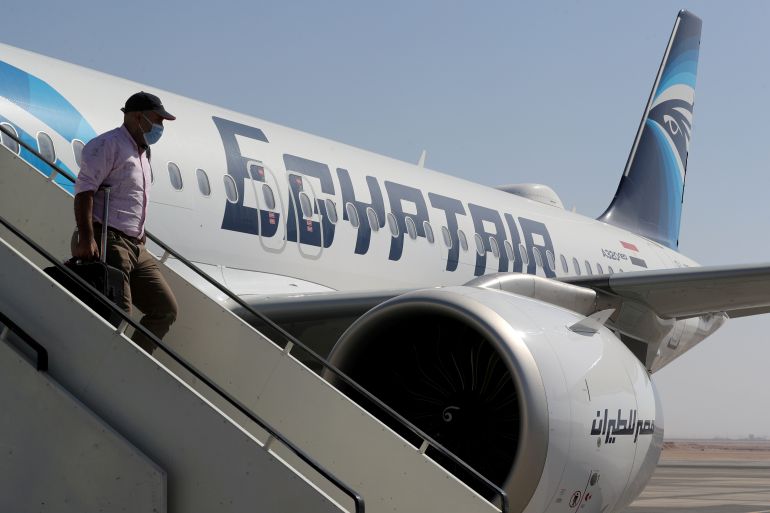Pilot smoking cigarette caused 2016 EgyptAir crash: Report
66 people died in the 2016 crash, which Egyptian authorities initially blamed on terrorism.

The 2016 crash of EgyptAir flight MS804 from Paris to Cairo, which Egyptian authorities initially described as an act of terrorism, was caused by a pilot smoking a cigarette, an investigation has found.
The jet disappeared in the Mediterranean Sea between Crete and the coast of northern Egypt on May 19, 2016, carrying 66 passengers and crew, all of whom were killed. It took one month to locate the wreckage.
Keep reading
list of 3 itemsEgyptAir plane wreckage found in Mediterranean
EgyptAir flight recorders ‘severely damaged’
Egyptian investigators initially said they had found traces of explosives in the remains of victims of the flight. Cairo’s prosecutor general ordered an urgent state security investigation, but its findings were never made public.
A confidential 134-page investigation document compiled by French experts and sent to the Paris Court of Appeal now attributes the cause of the crash to the pilots’ cigarette smoking.
According to the report, obtained by Italian newspaper Corriere della Sera, the co-pilot’s oxygen mask was left in “emergency” mode instead of “normal” by a maintenance engineer.
The cigarette caused the oxygen to combust, provoking a spark that led to a fire. Shortly before disappearing, the plane’s detection system warned of smoke at the front of the plane, the report said.
The ACARS system, which transmits short messages between aircraft and ground stations, sent seven dispatches in two seconds, including a warning of malfunctioning of a computer system crucial to its flight manoeuvring mechanisms.
Neither the pilot, Mohammed Saied Ali Shokair, or the co-pilot, Mohammed Ahmed Mamdouh Assem, asked for assistance, the report said.
At the time of the crash, authorities were on maximum alert following the terrorist attack at the Bataclan concert hall in Paris and in Brussels.
Due to the terrorism claims, Egyptian authorities did not release their findings and did not produce a report within one year, as prescribed by international law.
France’s Bureau of Enquiry and Analysis for Civil Aviation Safety (BEA) analysed the plane’s black box, but intergovernmental agreements are preventing the French authorities – who are not officially in charge of the investigation – from divulging any information.
According to the Convention on International Civil Aviation (ICAO), the country in charge of the investigation must publicly provide a report within 12 months of the incident. If unable to do so, it must publish a provisional report on each anniversary of the event.
Egyptian authorities never released their findings, while French authorities have been unable to disclose any information, despite the fact that 15 French nationals were killed in the crash.
A source close to the French investigation was quoted by media in May 2017 saying that no traces of explosives were found on the remains of French victims on board the plane.
In a rare public statement, BEA said in July 2018 that “the most likely hypothesis is that a fire was sparked in the cockpit during cruising time and that it spread quickly, leading to the loss of control of the aircraft”.
However, it said it was “necessary to have a final report of the incident to be able to present to Egyptian authorities any divergences in opinions, as established by international regulations”.
The families of the victims have long demanded to know the answers to their many questions. “Six years later, we are still caught between wanting to know the truth and the feeling of exhaustion because things are not progressing as they should,” Julie Heslouin, who lost both her brother and father in the crash, told Corriere della Sera.
“We want to know why we lost our loved ones, and we don’t know that till this day.”